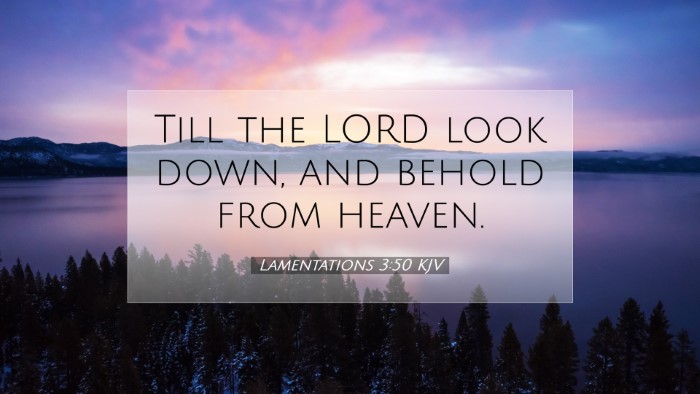Lamentations 3:50 Commentary
Bible Verse: "Till the LORD look down, and behold from heaven." (Lamentations 3:50, KJV)
Context and Overview
The book of Lamentations is a poignant collection of poetic laments for the destruction of Jerusalem and the suffering of the Jewish people. Authored by Jeremiah, these laments reflect profound sorrow and despair, yet they also reveal a yearning for God's intervention and mercy. Lamentations 3 specifically emphasizes personal anguish, a cry for divine attention, and hope for restoration.
Insight from Public Domain Commentaries
Matthew Henry
Matthew Henry notes that the longing expressed in Lamentations 3:50 underscores a deep spiritual anguish due to the silence of God amidst suffering. He emphasizes the significance of divine observation, stating, "Our great concern is that God should look down upon us, and not shut his eyes in our afflictions." This verse reflects the desperation of the afflicted heart that seeks affirmation of God's awareness and concern.
- Divine Attention: Henry suggests that the phrase "look down" indicates an act of God setting His gaze upon humanity, highlighting His omniscience and personal concern for the plight of His people.
- Heavenly Perspective: The idea of beholding "from heaven" emphasizes the transcendence of God, reminding believers that even from His heavenly throne, God's watchful eye is upon the circumstances of His creation.
Albert Barnes
Albert Barnes provides a more contextual interpretation, focusing on the cultural and historical significance of the lament. He argues that the cry to "look down" is a plea born out of an intense period of grief, characterized by exile and loss. Barnes articulates that this expression of need signifies a recognition of human frailty and an appeal to divine grace.
- Recognition of Mortal Need: Barnes emphasizes the importance of acknowledging one's own helplessness. The act of calling upon God signifies humility and recognition that restoration can only come from Him.
- Hope Amid Suffering: The lamentation also carries the notion of hope that God will not remain passive forever, implying that divine assistance is both desired and anticipated.
Adam Clarke
Adam Clarke's commentary delves into the theological implications of God's observation from heaven. He argues that the request for divine attention encapsulates the cries of the faithful enduring extreme trials. Clarke highlights that this verse serves as a reminder of God's omnipresence and His imminent involvement in earthly affairs.
- Imminent Divine Response: Clarke posits that the call for God to look down hints at an expectation of divine intervention, reinforcing the belief in a God who is actively engaged with the suffering of His people.
- Theological Reflection: He suggests that this moment is not just a plea for help, but also an inquiry into the divine nature. The lament urges reflections on the justice and mercy of God amidst suffering.
Theological Implications
Taken collectively, these commentaries provide profound insights into Lamentations 3:50. The verse stands as a poignant reminder of the need for divine attention in times of crisis. It compels readers to consider the weight of suffering and the necessity of crying out to God.
- God's Omniscience: The acknowledgment of God's all-seeing nature invites believers to seek His gaze deliberately during trials, fostering a deeper communion with Him.
- Dependency on Divine Mercy: The pleas in this verse reveal how humanity turns towards God in its weakest moments, a theological affirmation of God's foundational role in providing solace and restoration.
- Crisis as Catalyst for Faith: The very act of lamentation points to a faith that persists even in sorrow, suggesting that true hope is born through genuine expression of despair and the longing for God’s presence.
Conclusion
Lamentations 3:50 encapsulates a powerful sentiment that resonates throughout scripture: the necessity of calling upon God amidst suffering. The insights gathered from Henry, Barnes, and Clarke allow pastors, students, theologians, and scholars to deeply engage with this text, revealing the layers of meaning found in a seemingly simple plea for attention. As believers reflect on this verse, they are reminded of the enduring hope that accompanies sincere cries for divine intervention, underscoring both the fragility of humanity and the unwavering grace of God.


